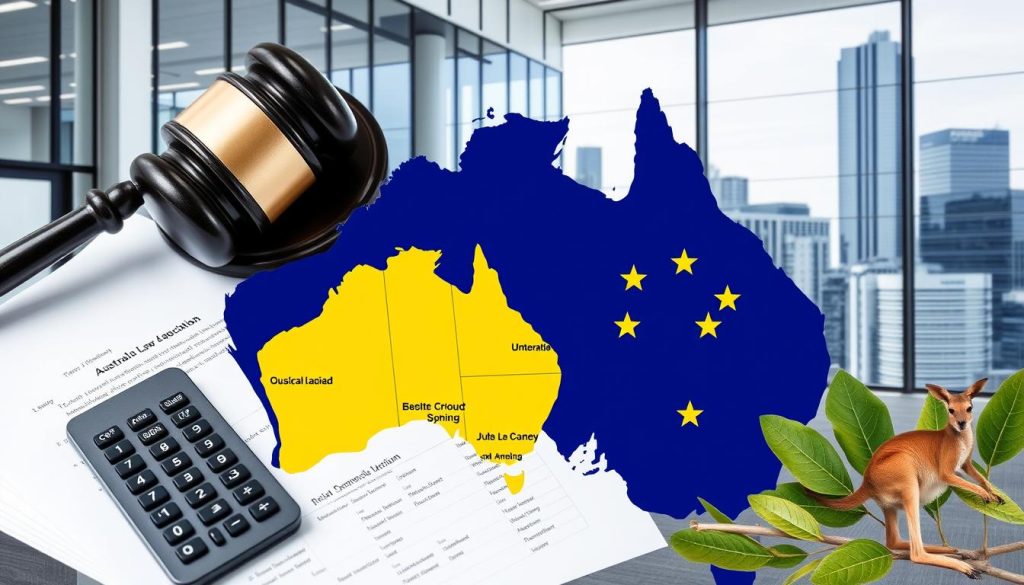UK businesses looking to grow globally need to know about the Australian market. This guide is here to help, covering key success factors. It’s all about understanding the challenges and opportunities in Australia.
From rules and regulations to cultural differences, businesses must be ready. This guide will prepare you to succeed in Australia’s dynamic economy.
Understanding the Australian Market

The Australian market is unique, with different people and their likes. A deep dive into the market shows how people act in various age groups and places. Knowing this helps businesses find their place and offer what people want.
Things like the economy, new tech, and rules shape the market in Australia. UK companies need to look at different areas to find where they can grow. For example, tech, health, and green products are in high demand.
- Demographic Insights: Australia’s population is moving to cities, where most shopping happens.
- Consumer Preferences: More people want products that are good for the planet and fair.
- Market Demand: Online shopping is changing how we buy things, making old ways less popular.
Using data from the Australian Bureau of Statistics and reports from IBISWorld helps businesses. With this knowledge, UK companies can find their spot in this exciting market.
Key Economic Indicators of Australia

For UK businesses looking to grow in Australia, it’s key to understand the country’s economic signs. These signs help businesses make smart choices and plan their investments. Important indicators include GDP growth, inflation rates, and job numbers.
The Gross Domestic Product (GDP) growth rate shows how well the economy is doing. Australia’s GDP has grown well, showing it’s a strong and promising market. A steady rise in GDP means good times for investing and growing businesses.
Inflation rates are also crucial. Changes in inflation can affect how much people can buy and the costs for businesses. Keeping an eye on inflation helps UK companies set prices and budgets wisely, avoiding risks from price swings.
Job numbers give a clear view of the labour market and consumer confidence. A low jobless rate means a strong economy and high demand. By looking at job numbers, businesses can see if they can find the right people and make smart hiring choices.
Cultural Considerations for UK Businesses

For UK businesses to thrive in Australia, they must grasp the local business culture. Knowing the customs and practices is key. It helps in effective communication and building strong relationships.
Australians value directness and openness in business. They are encouraged to share their thoughts freely. This is because Australia is egalitarian, where everyone is seen as equal.
- Expect a casual vibe in meetings. Australians enjoy friendly chats, which can improve relationships.
- While punctuality is important, there’s some flexibility. Showing up on time is a sign of respect.
- Humour is used to ease tensions. It’s a great way to start conversations.
It’s also vital to understand the local customs in business talks. Building trust takes time, as Australians like to know their partners well. Recognising these cultural differences can greatly help UK businesses in Australia.
Legal Requirements for Establishing a Business

It’s key for UK businesses to know the legal rules in Australia. There are many business types to choose from. Each has its own benefits and downsides, affecting things like liability and taxes.
The right choice depends on the business’s needs and goals.
Types of Business Structures
In Australia, you can find several common business types:
- Sole Trader: Simple to start, perfect for one person. But, the owner has all the risk.
- Partnership: Two or more people run the business together. They share profits, risks, and decisions.
- Company: A separate legal body from its owners. It offers protection but comes with more rules. It’s best for big businesses.
Registration and Compliance
Getting a business registered is a must. Every business needs an Australian Business Number (ABN) to operate legally. The rules you must follow depend on your business type.
For example, companies must follow the Australian Securities and Investments Commission’s rules. It’s important to keep up with these rules to avoid fines.
Market Entry Strategies for UK Enterprises

Entering the Australian market is full of chances for UK businesses. They can pick from direct investment, business partnerships, or franchising. Each option has its own benefits and hurdles.
Direct Investment vs. Partnerships
Direct investment means UK companies setting up in Australia. They can start new or buy existing businesses. This gives them full control but needs a big investment and local law knowledge.
Business partnerships share risks and resources. Working with local firms offers market insights and helps with regulations. This way, businesses can grow without spending too much.
Franchising Opportunities
Franchising is a flexible way for UK businesses to enter Australia. It uses local franchisees’ networks and knowledge. Retail, food, and health sectors are good for franchising.
It’s important to know franchising agreements well. Look at fees, royalties, and brand standards. Success stories like Boost Juice and Funtopia show franchising’s potential in Australia.
Doing Business in Australia: Navigating Taxation Policies

Australia’s tax system is key for UK businesses looking to start up. It’s vital to know the tax registration and ongoing tax needs. The Goods and Services Tax (GST) is also important for businesses, so it’s worth looking into its effects.
Tax Registration and Requirements
UK businesses must get an Australian Business Number (ABN) before starting. This number is for tax purposes. Here’s what you need to know:
- Check if your business needs to pay taxes based on its income.
- Sign up for GST if you expect to make over AUD 75,000.
- Learn about state taxes, like payroll taxes.
Goods and Services Tax (GST)
GST is a big part of taxes in Australia. It’s 10% on most goods and services. Knowing what’s exempt and what’s not is important. Here are some GST facts:
- You must register for GST if your sales are over a certain amount.
- The Australian Taxation Office has lots of info on GST returns and staying compliant.
- Some goods might not have GST, which can change your tax bill.
Employment Regulations and Labour Market Insights

For UK businesses looking to set up in Australia, knowing the employment rules is key. The country has its own set of rules about work contracts, safety, and the labour market. Following these rules helps create a good work environment and avoids risks for employers.
Understanding Employment Contracts
Employment contracts in Australia spell out what employers and employees must do. These contracts must follow the rules, making sure everyone knows their part. Important parts usually include:
- Job description and duties
- Wages and payment frequency
- Hours of work and leave entitlements
- Termination conditions
Employers should give a written contract to make things clear. Knowing about different types of contracts, like full-time and part-time, helps businesses fit into the labour market well.
Workplace Health and Safety Standards
Keeping workplaces safe is a big deal in Australia. Safe Work Australia makes the rules for health and safety, which employers must follow. Important things include:
- Risk assessment and management strategies
- Provision of personal protective equipment
- Training and induction programs on health and safety
- Regular safety audits and reviews
These steps not only meet legal standards but also make for a better work place. Knowing these safety rules is crucial for businesses to thrive in Australia’s labour market.
Navigating Trade Barriers and Opportunities

UK businesses wanting to enter the Australian market face trade barriers. These include import/export rules and tariffs. Knowing these rules is key to making the most of trade chances.
Import/export rules can be tricky. They cover customs procedures, standards, and what documents you need.
Some big trade barriers are:
- High tariffs on certain goods, which can change prices and how competitive you are.
- Non-tariff barriers like quotas and import licenses, which can limit how you enter the market.
- Tough health and safety rules that must be followed before you can import goods.
But, there are also great trade chances in Australia. Areas like tech, green energy, and healthcare are open to UK businesses. By getting the import/export rules and having a clear plan, you can succeed.
Doing deep market research, working with local experts, and using UK Export Finance are good steps. Building strong ties with Australian partners can also help a lot.
Building Relationships with Australian Stakeholders

Building strong relationships with stakeholders is key to success in Australia. The local market values trust and teamwork. Good business networking helps create these vital connections.
Here are some ways to build stakeholder relationships:
- Engage with local businesses to know their needs and hopes.
- Join industry events to show your brand and meet potential partners.
- Use platforms like LinkedIn Australia to connect with key people.
- Build trust by being open and keeping communication steady.
To gain trust in Australia, show you’re reliable and have a good reputation. You can do this by:
- Keeping promises and commitments to stakeholders.
- Offering quality products and services that meet local standards.
- Listening to feedback and making changes based on what stakeholders say.
Strong stakeholder relationships through good networking can lead to lasting success in Australia. Focusing on these connections boosts your credibility. It also opens up new chances for partnerships and growth.
Networking Strategies for UK Entrepreneurs

For UK entrepreneurs aiming to succeed in Australia, networking is key. It helps increase visibility and build crucial business connections. There are many ways to connect with the local business community.
Professional networking events are great for meeting others in your field. They’re a chance to share ideas, form partnerships, and find collaborators. UK entrepreneurs should look out for events by the Australian Chamber of Commerce and Industry.
Meetup Australia is another good place to network. It lets entrepreneurs join groups that match their interests. This can lead to new partnerships and mentorship.
Being part of industry associations is also important. They offer special events and resources for business growth. Being active in these groups boosts your reputation and connections.
By using these strategies, UK entrepreneurs can grow and find new opportunities in Australia.
Utilising Digital Tools for Business Development

In today’s fast-paced world, UK businesses aiming for success in Australia must use digital tools. These tools are key to their growth strategy. Australia’s technology offers many resources to make operations smoother and boost growth chances.
Using e-commerce platforms lets businesses reach more customers online. They can sell products and services anytime. This move makes it easier for customers to find and buy what they need.
Customer relationship management (CRM) software is also crucial. It helps manage interactions with customers. This leads to happier customers and keeps them coming back, which is vital for success.
Digital marketing strategies are another important part of business plans. They help businesses be seen by Australian consumers. Social media and SEO are great for reaching out to the local market and boosting brand awareness.
In short, using digital tools in Australia can bring big benefits. By keeping up with digital changes, UK businesses can grow and succeed in the Australian market.
Financial Considerations for Australian Ventures

When UK businesses enter the Australian market, they must grasp financial aspects. There are many funding options to help new businesses build a strong financial base. Getting the right funding is key to growing and staying stable in Australia’s competitive business scene.
Funding Options for New Enterprises
There are several funding sources for businesses starting in Australia. These include:
- Venture Capital: This option gives big financial support to startups with big growth plans. It also offers help from experienced investors.
- Grants: Government grants are available through Business.gov.au Funding Finder. They offer free money to help businesses start or grow.
- Loan Facilities: Banks and private lenders offer loans for business needs. These loans come with interest but help with short- and long-term plans.
To get financial support, you need a detailed business plan. This plan should show your vision and how you’ll run your business. It’s important to manage your money well and know the financial duties of each funding choice.
Marketing Your Business in Australia

For UK businesses looking to enter the Australian market, creating effective marketing strategies is key. It’s important to understand how consumers behave in different areas. By tailoring your marketing to fit these varied tastes, you can boost engagement and sales.
Understanding Consumer Behaviour
Australian shoppers have their own unique ways of behaving. This is shaped by their culture and lifestyle. Knowing these traits is vital for making your marketing work well.
- They often prefer local products and care about the environment.
- They like brands that show they care about social issues.
- They want shopping experiences that feel personal.
By learning about these habits, UK businesses can make ads that really speak to people. This can help build loyalty and make your brand more known in the market.
Social Media Trends in Australia
Social media is a big deal for reaching out to customers in Australia. Sites like Facebook, Instagram, and TikTok are where it’s at. Here’s what’s hot right now:
- Video ads are more popular than ever.
- Working with influencers is becoming more common to seem real and trustworthy.
- Live streaming and Q&A sessions are key for talking directly to customers.
Using these trends in your marketing can help you connect with people in a meaningful way. This can lead to growth and success.
Success Stories: UK Businesses Thriving in Australia

Case studies of UK businesses in Australia show how they’ve overcome challenges. They’ve found success by being adaptable and innovative. This helps them stand out in a competitive market.
For example, Marks & Spencer has made a big impact in Australia. They’ve mixed their British products with local tastes. This has made them more appealing to Australian shoppers.
Sage Group, a British tech firm, has also done well. They’ve worked closely with Australian businesses, offering solutions for better financial management. This has built strong relationships and shown the value of local knowledge.
In the travel industry, UK companies like Intrepid Travel have excelled. They’ve focused on eco-tourism and real experiences. This has won them fans in Australia, showing the power of matching business models with consumer trends.
These success stories are a guide for other UK businesses looking to expand in Australia. They offer valuable lessons on how to succeed and grow in this market.
Future Trends in the Australian Business Landscape
The Australian business scene is changing fast, thanks to new trends. The Australian Bureau of Future Trends says digitalisation and sustainability are key. Companies are using new tech like AI and automation to work better and please customers.
This change brings new chances for growth. It also means UK businesses might team up with local ones to use these new tools.
Also, how people shop is changing. McKinsey & Company found that Australians want things that are made just for them and are good for the planet. This means UK companies can offer special products that meet these new needs.
This shift shows Australia’s business future is bright. Being quick to adapt will be key to doing well.
Lastly, new rules for businesses are coming. KPMG’s Future of Business report says these rules will help innovation and fair play. UK companies need to keep up with these changes to be seen as reliable and to find new partners.
By getting on board with these trends, UK businesses can do well in Australia’s competitive market.

